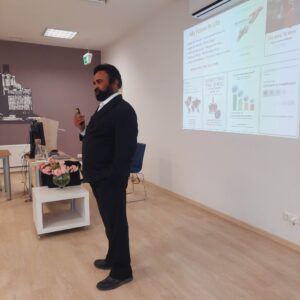You are known as the initiator of the Smart Villages movement. What makes this movement, born six years ago, important in the modern world?
In smart villages, priority is given to environmental conservation. If the planet is in danger, so are we. Therefore, the planet and its people come first, followed by technology and business.
Only a small part of the world’s population lives in the US or Europe. The majority of the population is concentrated in India, China, Indonesia, Africa, and other regions that are often overlooked. These regions lack access to goods, services, and adequate living conditions. The main goal of smart villages is to promote the sustainable development of these regions. When people live within their local ecosystems, consume locally grown food, and travel less, they contribute value to the world while supporting their communities.
Digital technologies today allow us to achieve these goals. Let’s consider that approximately 1.5 billion people, more than India’s entire population, travel by airplane each year. This results in significant fuel consumption, wasted time, and resource depletion for transportation and accommodation. If these people lived in their communities connected to the world through the internet and with access to proper energy sources, they could acquire relevant qualifications and work for international companies from their villages or towns. These individuals can obtain the necessary certificates, equipment, and employment opportunities, thereby preserving their personal happiness.
Why would they be happier? Because they would stay with their families and communities, preserving their traditions and family heritage. The concept of smart villages encompasses all these aspects.
In these smart villages that create added value for their communities and the entire world, complex infrastructure is unnecessary. The only essential condition is internet access and digital platforms. We invest in people’s abilities to live within their environments, providing them with opportunities to create value using global technologies. We empower those living in remote, less urbanized areas, which usually have fewer opportunities. In doing so, we fulfil another important mission – caring for each other, promoting equality and fairness.
How does the Smart Villages movement work?
Together with the Berkeley team, we conducted the first pilot program. Our goal is to help people in poverty-stricken areas of India gain access to international markets. Even though they have the data to operate successfully, they lack the knowledge and skills to leverage their opportunities. We help them open bank accounts, obtain basic knowledge, set up basic websites, and learn to use shipping and other essential services. For example, for a woman living in an Indian village, performing these tasks alone for the first time would be challenging. However, with minimal assistance from us, she can not only start her own business but also teach ten other village women and all her family members. In this way, rural residents engaged in their activities reach customers worldwide – from San Jose to London, from Melbourne to Chicago.
This approach saves resources, time and promotes efficiency and quick market operation. All these factors illustrate the power of the smart villages concept, which prioritizes environmental conservation and empowering ordinary people.
Can you share practical examples of how technology fosters sustainable development in the context of smart villages?
Let me share a story with you. One of the ministers from an Indian state visited Berkeley and expressed interest in the concept of the smart village. His main goal and desire were to keep young, talented, and motivated people living in the state. To achieve this, he wanted to provide residents with opportunities to learn programming and use digital technologies properly.
Typically, skilled and motivated individuals in India migrate to larger cities or other countries, benefiting others rather than their own communities. Upon receiving his request, I agreed to contribute to achieving his goals. I reached out to various companies, and Salesforce committed to teaching people through digital platforms. All they need is internet access to learn. The company teaches programming, provides necessary equipment, and offers employment opportunities. This initiative is already underway.
Similarly, any global company can seek talents for themselves. We learned from the pandemic that physical contact is not necessary to create value. This approach is not only friendly to the environment but also to people while being more effective for business. This embodies sustainability – living happily with our families without harming the planet.
In your opinion, what are the best ways for businesses to contribute to sustainable development?
A business that has only one goal – to pursue profit, and mostly financial profit – is the main destroyer of the planet. Let’s agree that human nature is often selfish and survival-oriented. People need to be educated and enlightened to relinquish their selfish instincts as they grow. For example, when my daughter was born and started speaking, instinctively took things and said, “This is mine.” We didn’t teach her that; she was born that way. However, as she grew up, we taught her to share and discovered that sharing is much more amazing than taking.
The same goes for business. Businesses need to forget about focusing solely on profit. They should perform environmentally friendly actions, seek collective growth and success.
Businesses should nurture a sense of responsibility in people. Greed, often displayed nowadays, has led us to a scenario where the planet is at risk of collapse. We need to change this business model. The Smart Villages Movement is a signal that we must promote sustainability, equal opportunities, and a brighter future for everyone on the planet.
The partnership between KTU and the University of California, Berkeley is part of the “In4Act” project, implemented by KTU School of Economics and Business and funded by the European Union’s Horizon 2020 project. Learn more at https://in4act.ktu.edu/



